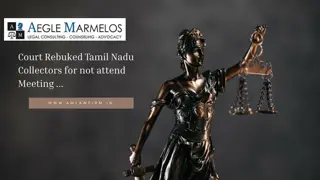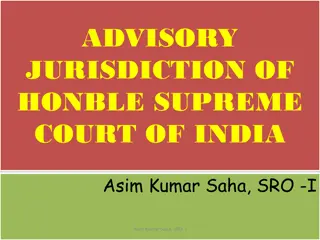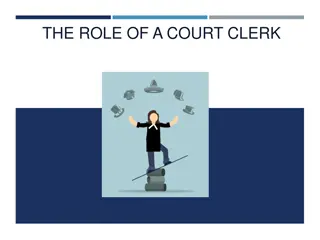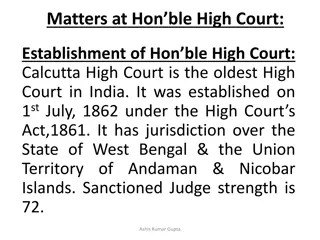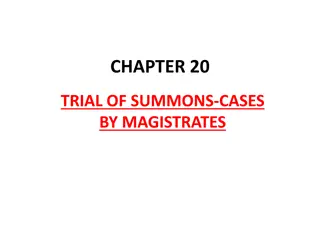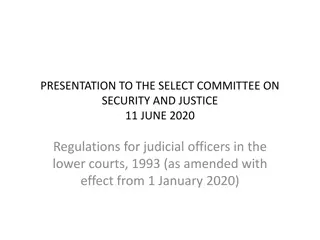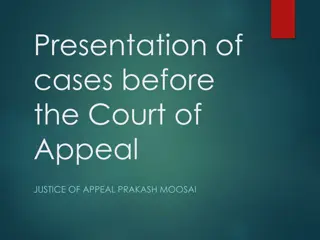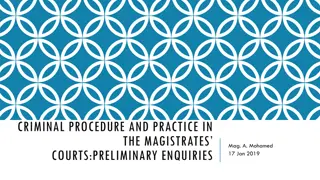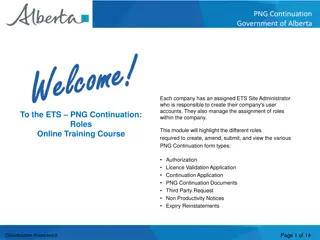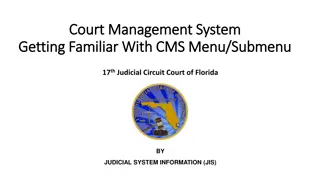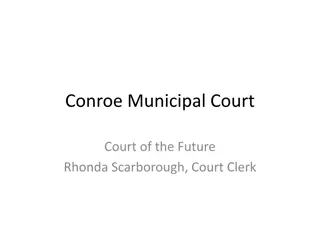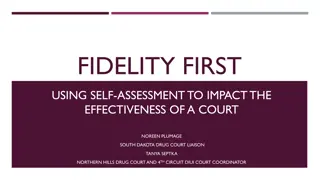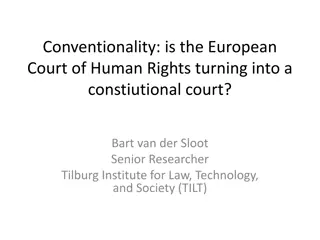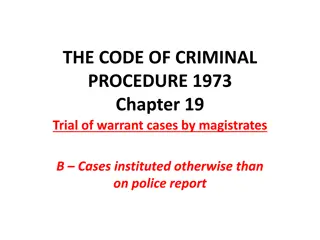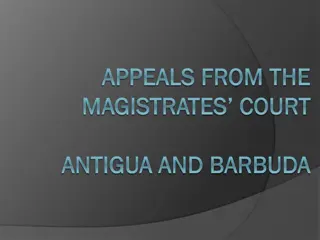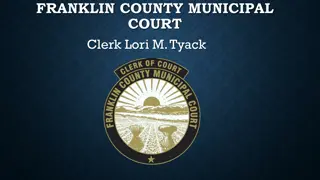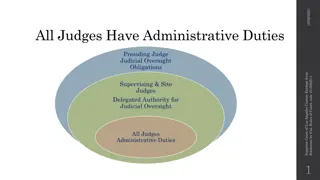Understanding Magistrates Court: Roles and Responsibilities
Magistrates are appointed judges with limited powers who play a crucial role in initiating criminal charges, making probable cause findings, and conducting various legal proceedings. They serve unique roles within the state justice system, working diligently without traditional overtime or weekend pay. Learn about the history, duties, and key aspects of magistrates in this informative guide.
Download Presentation

Please find below an Image/Link to download the presentation.
The content on the website is provided AS IS for your information and personal use only. It may not be sold, licensed, or shared on other websites without obtaining consent from the author. Download presentation by click this link. If you encounter any issues during the download, it is possible that the publisher has removed the file from their server.
E N D
Presentation Transcript
An Introduction to Magistrates Court Dexter Williams Chief Magistrate, Wake County
What Is a Magistrate? Magistrates are appointed judges with defined terms of service and limited powers Criminal Magistrates initiate criminal charges and make probable cause findings
Facts About Magistrates Serve a Four Year Term Nominated by Clerk Appointed by Senior Resident Superior Court Judge and Supervised by the Chief District Court Judge
The Only Easy Day Was Yesterday Magistrates work 24/7/365. In some counties, Magistrates are on call at various times. Not so in Wake County and other urban counties.
Magistrates Are Unique Among State Employees, only Magistrates work without overtime pay, holiday pay, shift differential pay and weekend pay. Expected to work at least 40 hours per week.
Magistrates are salaried employees, and are paid identically across the state. Thus, a Wake County Magistrate is paid the same as a Tyrrell County Magistrate
History of Magistrates Formerly known as Justices of the Peace Office reformed when General Court of Justice Created Magistrates are State Officers of the Court, not local
Main Duties of Criminal Magistrates Issue Criminal Process Issue Search Warrants Set Conditions of Release Preside Over Initial Appearances License Revocations Involuntary Commitments
Criminal Process Magistrate finds or denies probable cause when a law enforcement officer or member of the public seeks to have charges filed Process can be a warrant, or in misdemeanor cases, a summons When defendant already under arrest, charging instrument is the Magistrate s Order.
Probable Cause Magistrate takes sworn testimony from complainant and decides whether or not to charge defendant. This is an immense power of magistrates. When member of the public is the complainant, Magistrate will often favor issuing a summons, rather than warrant.
Its Not Automatic Magistrate has discretion when deciding to issue criminal charges based on testimony of member of public. Remember: The Magistrate wasn t there. A certain level of healthy skepticism is present.
Search Warrants Issued upon sworn testimony as provided by US and NC Constitutions. Are available to LEOs 24 hours a day, 7 days a week. Copies temporarily kept at Magistrate Office, thereafter at Clerk
Conditions of Release When an arrestee is brought before the Magistrate, it is he who decides whether arrestee goes free, or goes to jail. This is one of the most powerful aspects of the Magistrate s position.
Release Condition Options Written Promise Custody Release Unsecured Bond Secured Bond Cash Bond No Bond
Unsecured Bond Functions like a WPTA in that Defendant may leave after signing. Bond amount set at discretion of Magistrate. Possibility of forfeiture of bond amount if defendant fails to appear.
Secured Bonds Can be secured by real property, owned by one other than defendant. Process is streamlined for bonds under $10,000, more complex for higher bonds. Can be secured by bondsman or paid in cash. May be modified upon review by a judge.
Special Conditions Defendant may be released only to certain individuals, or enjoined to avoid certain people or behaviors. Defendant may be required to enroll in a program such as Pretrial Release to exit.
Domestic Violence Domestic Violence arrestees get special treatment. Often, these can only be released after a waiting period, or until review by a District Court Judge. Typically, these defendants are forbidden to contact victim.
Release Condition Factors When Magistrates commit defendants to jail, this is often the only jail time defendant will face as a consequence of the offense. Key consideration is public safety. Purpose of setting a bond is not to punish defendant.
How Much Bond? Amount of bond depends on severity of crime, likelihood of flight, history of defendant. Often, the amount of the bond is not up to the Magistrate. Bond may be pre-set by arrest warrant.
Pretrial Release Policies Administrative order issued by SRSCJ and CDCJ. Sets forth general guidelines for bond amounts for various levels of offenses. Also specific, mandatory conditions of release for certain offenses, e.g. domestic violence. This important document is available to attorneys.
DWI Release Conditions DWI is easily the most complicated misdemeanor charge a Magistrate handles. Must strike a balance between public safety and ability of arrestee to defend himself against charges.
DWI Free Bird DWIs tend to get WPTAs, but not always. There are many instances where a DWI defendant may be held under bond, or held temporarily for the protection of the defendant.
Involuntary Commitments Magistrates conduct hearings to determine whether an individual should be placed under the care of a mental health caregiver. Standard is whether person is a danger to himself or to the community
The Commitment Hearing Magistrate takes sworn testimony from doctor or member of the community. Substance abuse or mental illness. This process may not be used for person already under arrest.
Weddings! Magistrates marry thousands of people across the state. All it takes is a valid marriage license, 2 witnesses and $20. Magistrates can do weddings off- site, but often are wary of doing so.
Contempt Magistrates can find a person in contempt for behavior in the presence of the magistrate. Magistrate may impose a jail sentence of up to 30 days. Jail sentence may be dissolved by Superior Court Judge.
Values of a Magistrate Magistrates do not function as an arm of the DA s office, or of the police. Magistrate s are independent and committed to fairness and service to the public.





